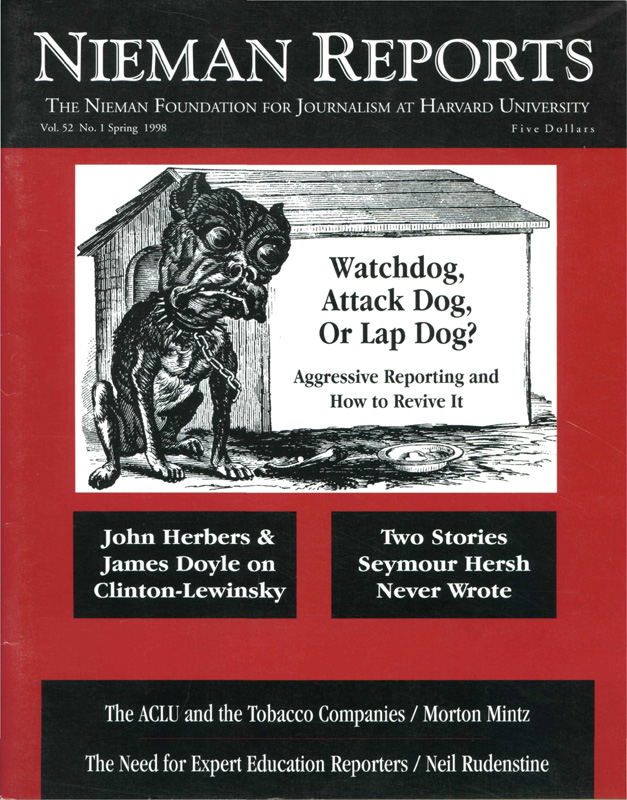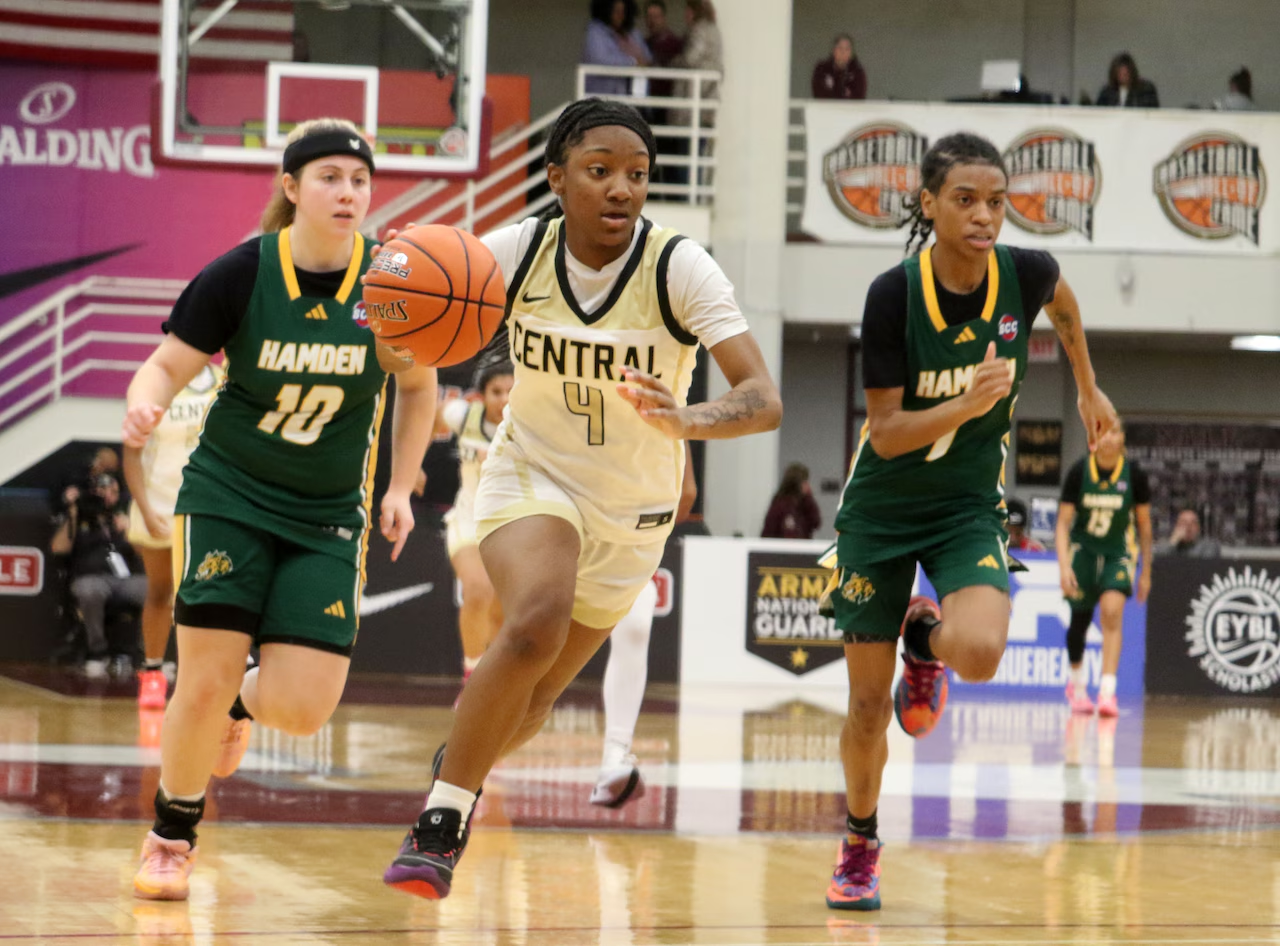
Watchdog, Attack Dog, or Lapdog?
This issue on Watchdog Journalism originated with a call by Murrey Marder, the retired Washington Post Diplomatic Correspondent, for a return to more aggressive, but responsible, reporting. The package begins with two articles on the media's handling of the accusations that President Clinton had an improper sexual relationship with Monica S. Lewinsky. Excerpts from a seminar by Seymour Hersh, the Pulitzer Prize-winning investigative reporter, follow. Then we offer position papers on the status of watchdog journalism in four areas—the economic sector, state and local government, national security and nonprofit organizations.
Joyce Purnick speaks for many a metro and state editor when she describes the strain of keeping up with the news while watching for the big stories. At a midsize regional paper, the metro desk always answers the phone for a plane crash, weather disaster or late-breaking crime story. Legislative reporters have to be there to cover progress of the "bill that would" (lengthen criminal sentences, revolutionize day care and so forth). Reporters who like digging always have five tips tucked away for every one they pursue. Yet the biggest obstacles may be more fundamental than a lack of time or money. What state and local reporting need most is training for reporters and support from top editors: encouragement, good play and praise for the extra work it takes to do stories that reveal rather than speculate.
I have a joke about "the glamour of investigative reporting," which I've often cracked late on a night when a couple of reporters are hunkered over a stack of documents and the coffee's on for all of us. This kind of work is difficult. It's tedious, frustrating and sometimes fruitless. Someone in a newsroom has to be cheering for folks who try it. Someone has to teach how to read documents, interpret numbers, obtain databases, analyze statistics, use public records laws and, as Purnick notes, go to court when the bums don't give up the information. Editors who want their newsrooms to produce aggressive reporting have to get excited about stories that are going to take time, and help beat reporters do the juggling needed to pursue the tougher stories. I've never seen a newspaper hungry to do this kind of work that couldn't pull it off at all. What's missing, too often, is that desire.
The lack of commitment can't be blamed entirely on an overload of hard news. Editors and reporters may not spend enough time talking about stories and coverage with enough depth to go beyond superficial questions. As journalists, our skills may be behind the times to the degree that we can't report as aggressively or effectively as we should. Among editors, we might be too out of touch with information-gathering to teach reporters as we ought to. We are indeed slaves to the agendas of institutions and politicians. Instead of providing reports that help inform the public agenda, we often spend our time chasing conflict and explaining, endlessly, the various sides involved in disputes.
Conflict is the tinder for news stories, but Purnick is right in noting that conflict often masks what's really happening. In 1996 my newspaper won awards for a series of reports on the pork industry, including investigative work revealing how the chief executive of the nation's biggest hog company had pushed through a number of hog-friendly laws during 10 years in the state Senate. The irony was that none of those laws generated a dispute when it was passed, and thus we had overlooked most of them at the time. My guess is that we miss more significant legislation than we cover, because no one calls attention to it We report on campaign contributions and the implied influence of corporations or industries on particular legislators, members of Congress, governors and Cabinet members. We're not as good at showing what effect, if any, these contributions have on the way people govern.
I too think that as news leaders, we have to put money behind our commitment to journalism that matters. Investigative reporting, aggressive daily journalism and good beat work all can put readers in the rooms where decisions are made. In many cases, business and government leaders set the course for public policy without public discussion. Aggressive reporting, whether it's project-level work or a breaking daily, gives the public a view of the process and the opportunity to have a voice in decisions.
The starting point for aggressive reporting is a well-developed sense among newsroom leaders of what that phrase means. Investigative reporting is many things to many people. Some think the aim is simply to get a government official in trouble, or out of a job. Others think it means proving criminal fraud. Some draw heavily on unnamed sources; others, including our newsroom, prefer documentable, on-the-record reporting. Aggressive reporting needs context, both for readers and for news staff.
Beyond an attitude that guides reporters and editors to pursue the tough stories, a newsroom needs expertise. Today's great reporters cultivate some skills that weren't needed 10 years ago. In my newsroom, the best reporters coach and teach colleagues who ask for the help. We're working on spreading the skills, through brown-bag sessions, one-on-one coaching, team-ups of investigative reporters and beat staffers, and a more formal development program now under construction. Continuing education is a concept that journalism has never really embraced. For reporters and editors who want to produce definitive work, however, learning has to happen all the time, on the job and through extra efforts.
As difficult as it is to pull off successful investigative reporting, few other forms can be as satisfying. When a newspaper reveals wrong-doing with clear impact;when it uncovers secrets of obvious public interest; when it reveals the deeper story behind the superficial problem, it becomes truly valuable for readers and its community, large or small. As scarce as the resources seem sometimes, they're far greater than those at the disposal of any single person. After all, that's why we're here. My suggestions are basic. Look for patterns in the news, and mobilize your people to find out what's causing them, who's benefiting and who's paying. Ask questions about stories, and spend plenty of time talking about coverage. Push reporters to answer the tough questions, on deadline or in enterprise pieces. Those basic questions are the foundation for any investigation.
Encourage your beat reporters to know who the players are and what their interests are—then watch for those interests in action. Invest in follow-up stories. Train your reporters and editors to be unbeatable in getting information. And look for that reporter hunched over her desk every night when you're headed for the parking deck. Chances are she's after the kind of story you want. She just might not know you care.
 Melanie Sill, 1994 Nieman Fellow, is Managing Editor of The News & Observer in Raleigh, N.C. In 1996, The N&?0 won the Pulitzer gold medal for public service for "Boss Hog," a series of stories on environmen?tal and community problems caused by the rapid expansion of industrial pork operations in rural North Carolina.
Melanie Sill, 1994 Nieman Fellow, is Managing Editor of The News & Observer in Raleigh, N.C. In 1996, The N&?0 won the Pulitzer gold medal for public service for "Boss Hog," a series of stories on environmen?tal and community problems caused by the rapid expansion of industrial pork operations in rural North Carolina.
I have a joke about "the glamour of investigative reporting," which I've often cracked late on a night when a couple of reporters are hunkered over a stack of documents and the coffee's on for all of us. This kind of work is difficult. It's tedious, frustrating and sometimes fruitless. Someone in a newsroom has to be cheering for folks who try it. Someone has to teach how to read documents, interpret numbers, obtain databases, analyze statistics, use public records laws and, as Purnick notes, go to court when the bums don't give up the information. Editors who want their newsrooms to produce aggressive reporting have to get excited about stories that are going to take time, and help beat reporters do the juggling needed to pursue the tougher stories. I've never seen a newspaper hungry to do this kind of work that couldn't pull it off at all. What's missing, too often, is that desire.
The lack of commitment can't be blamed entirely on an overload of hard news. Editors and reporters may not spend enough time talking about stories and coverage with enough depth to go beyond superficial questions. As journalists, our skills may be behind the times to the degree that we can't report as aggressively or effectively as we should. Among editors, we might be too out of touch with information-gathering to teach reporters as we ought to. We are indeed slaves to the agendas of institutions and politicians. Instead of providing reports that help inform the public agenda, we often spend our time chasing conflict and explaining, endlessly, the various sides involved in disputes.
Conflict is the tinder for news stories, but Purnick is right in noting that conflict often masks what's really happening. In 1996 my newspaper won awards for a series of reports on the pork industry, including investigative work revealing how the chief executive of the nation's biggest hog company had pushed through a number of hog-friendly laws during 10 years in the state Senate. The irony was that none of those laws generated a dispute when it was passed, and thus we had overlooked most of them at the time. My guess is that we miss more significant legislation than we cover, because no one calls attention to it We report on campaign contributions and the implied influence of corporations or industries on particular legislators, members of Congress, governors and Cabinet members. We're not as good at showing what effect, if any, these contributions have on the way people govern.
I too think that as news leaders, we have to put money behind our commitment to journalism that matters. Investigative reporting, aggressive daily journalism and good beat work all can put readers in the rooms where decisions are made. In many cases, business and government leaders set the course for public policy without public discussion. Aggressive reporting, whether it's project-level work or a breaking daily, gives the public a view of the process and the opportunity to have a voice in decisions.
The starting point for aggressive reporting is a well-developed sense among newsroom leaders of what that phrase means. Investigative reporting is many things to many people. Some think the aim is simply to get a government official in trouble, or out of a job. Others think it means proving criminal fraud. Some draw heavily on unnamed sources; others, including our newsroom, prefer documentable, on-the-record reporting. Aggressive reporting needs context, both for readers and for news staff.
Beyond an attitude that guides reporters and editors to pursue the tough stories, a newsroom needs expertise. Today's great reporters cultivate some skills that weren't needed 10 years ago. In my newsroom, the best reporters coach and teach colleagues who ask for the help. We're working on spreading the skills, through brown-bag sessions, one-on-one coaching, team-ups of investigative reporters and beat staffers, and a more formal development program now under construction. Continuing education is a concept that journalism has never really embraced. For reporters and editors who want to produce definitive work, however, learning has to happen all the time, on the job and through extra efforts.
As difficult as it is to pull off successful investigative reporting, few other forms can be as satisfying. When a newspaper reveals wrong-doing with clear impact;when it uncovers secrets of obvious public interest; when it reveals the deeper story behind the superficial problem, it becomes truly valuable for readers and its community, large or small. As scarce as the resources seem sometimes, they're far greater than those at the disposal of any single person. After all, that's why we're here. My suggestions are basic. Look for patterns in the news, and mobilize your people to find out what's causing them, who's benefiting and who's paying. Ask questions about stories, and spend plenty of time talking about coverage. Push reporters to answer the tough questions, on deadline or in enterprise pieces. Those basic questions are the foundation for any investigation.
Encourage your beat reporters to know who the players are and what their interests are—then watch for those interests in action. Invest in follow-up stories. Train your reporters and editors to be unbeatable in getting information. And look for that reporter hunched over her desk every night when you're headed for the parking deck. Chances are she's after the kind of story you want. She just might not know you care.
 Melanie Sill, 1994 Nieman Fellow, is Managing Editor of The News & Observer in Raleigh, N.C. In 1996, The N&?0 won the Pulitzer gold medal for public service for "Boss Hog," a series of stories on environmen?tal and community problems caused by the rapid expansion of industrial pork operations in rural North Carolina.
Melanie Sill, 1994 Nieman Fellow, is Managing Editor of The News & Observer in Raleigh, N.C. In 1996, The N&?0 won the Pulitzer gold medal for public service for "Boss Hog," a series of stories on environmen?tal and community problems caused by the rapid expansion of industrial pork operations in rural North Carolina.


